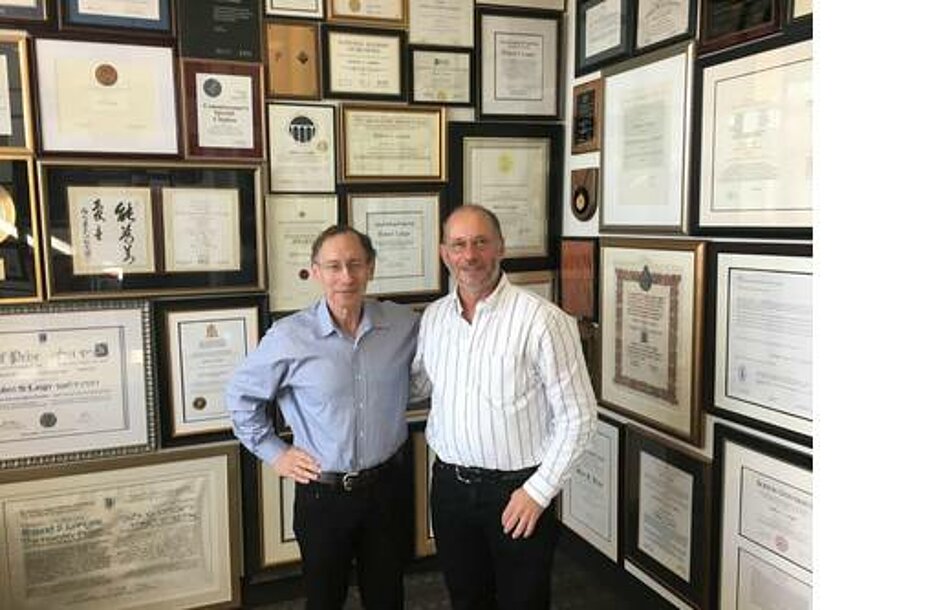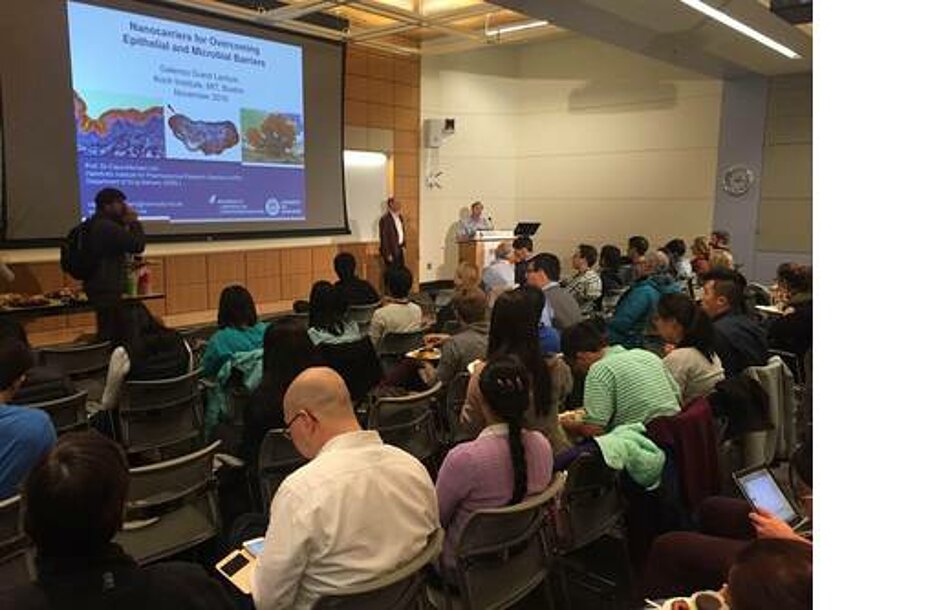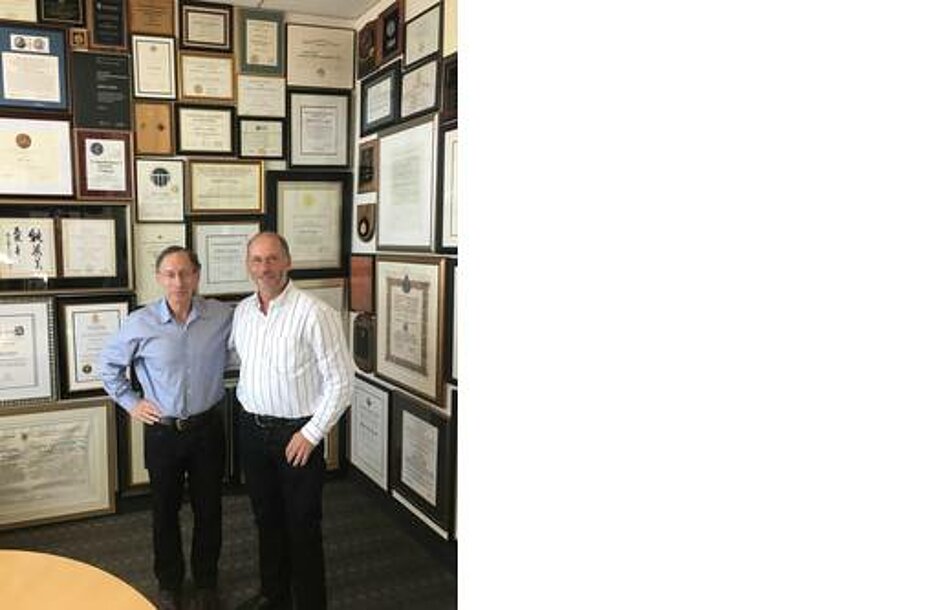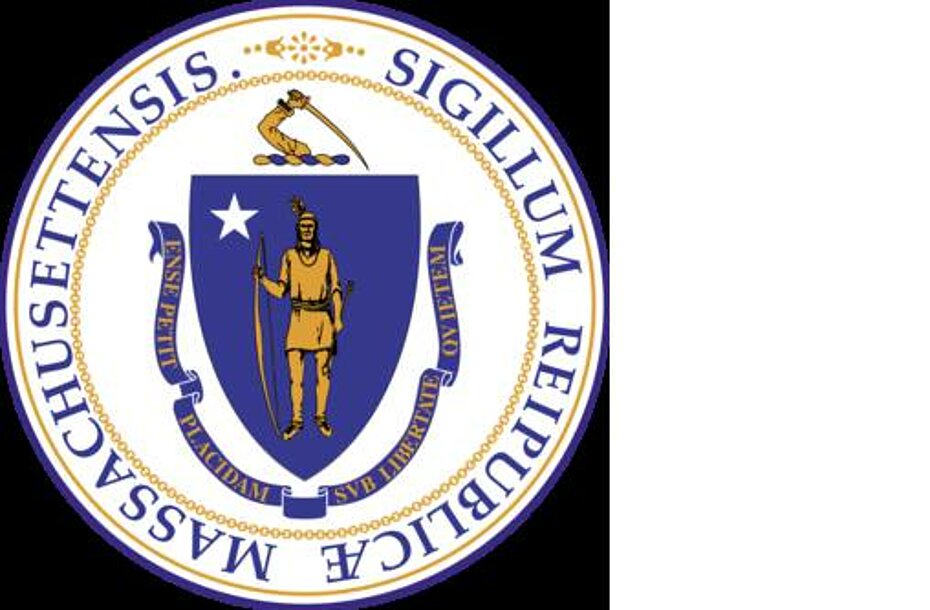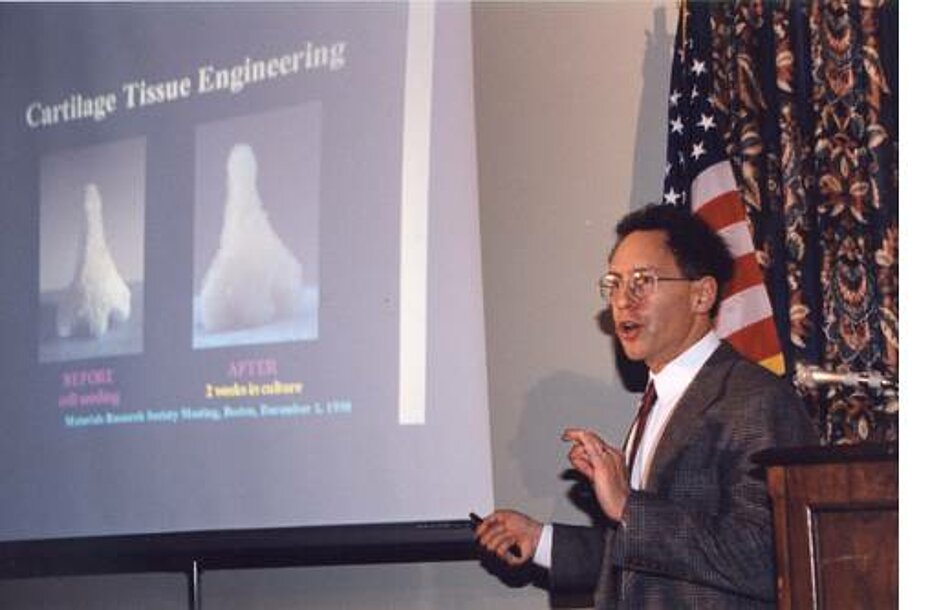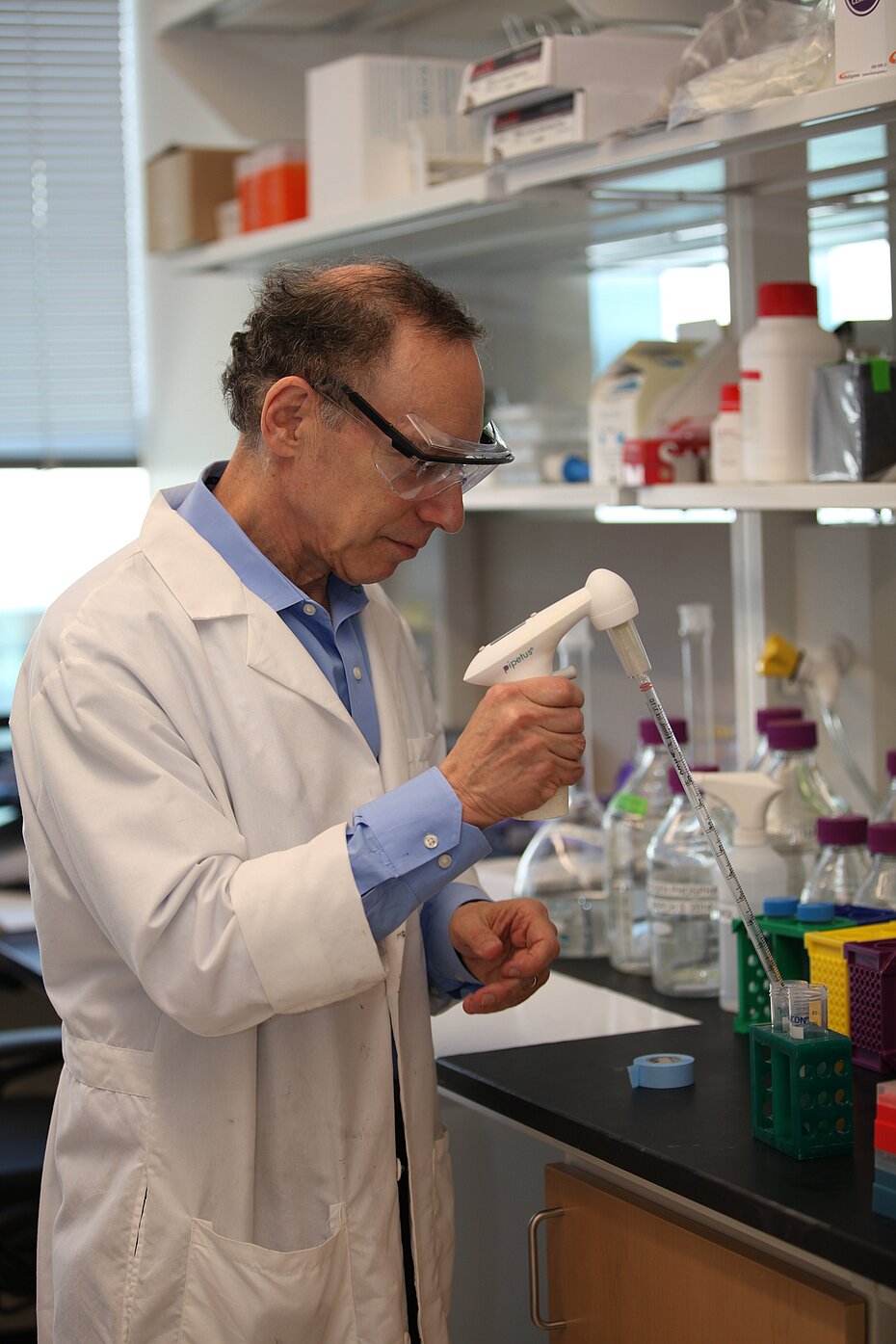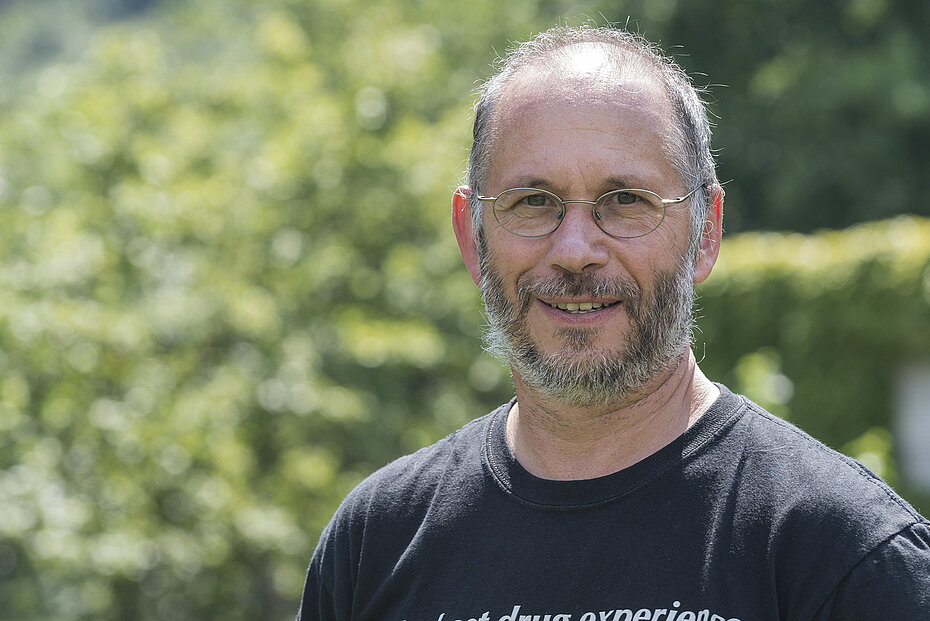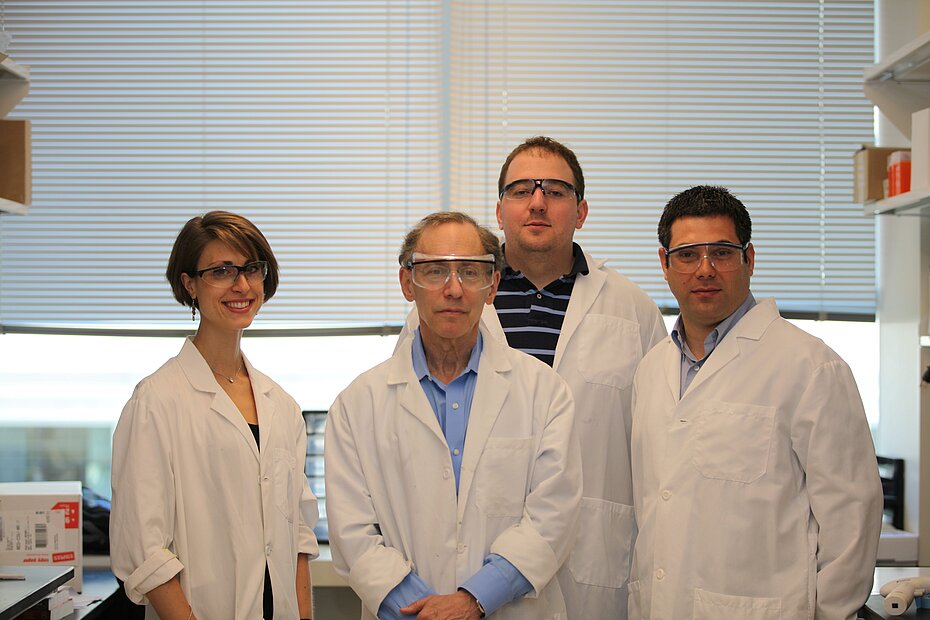Zu Gast bei Robert Langer am Massachusetts Institute of Technology (2016)
Vom 4. Oktober bis zum 14. November 2016 wird Prof. Dr. Claus Michael Lehr, Leiter des Helmholtz Instituts für Pharmazeutische Forschung an der Universität des Saarlandes, als Galenus Gastprofessor am Massachusetts Institute of Technology tätig sein. Sein Gastgeber, Prof. Dr. Robert Langer, gehört zu den weltbekanntesten Chemieingenieuren, die auf dem Gebiet der Pharmazeutischen Technologie und Biopharmazie seit mehr als 30 Jahren richtungsweisend tätig sind. Weitere Details zur bevorstehenden Gastprofessur am MIT werden an dieser Stelle im September 2016 veröffentlicht. Zur Person von Prof. Robert Langer verweisen wir auf den Artikel in Nature Online erschienen unter dem Titel: Profile-Being Bob Langer www.nature.com/news/2009/090304/full/458022a.html.
4th Transatlantic Galenus Guest Professorship at M I T
From October 4th to November 13th, 2016, Prof. Claus Michael Lehr, chair of the Helmholtz Institute of Pharmaceutical Research, Saarland, Germany, will be taking up the 4th Transatlantic Galenus Guest Professorship at the Massachusetts Institute of Technology. He will be hosted by Prof. Robert Langer, the preeminent chemical engineer working in the field of pharmaceutical technology and bio-pharmacy. Prof. Langer is the chair of the Koch Institute of Integrative Cancer Research at MIT. This institute has one of the largest academic laboratories in North America with over 100 young researchers. For further information about Prof. Langer's work please see the article 'Being Bob Langer' published in Nature (2009, 458 ,22–24) on the following link: www.nature.com/news/2009/090304/full/468022a.html. As part of his Galenus Guest Professorship Prof. Lehr will deliver a keynote lecture on 'Drug delivery across Epithelial and Bacterial Barriers' on November 7th, 2016, 3–4 pm EST. This will be broadcast via live-stream to Vienna and will also be available later in the year on the website of the Galenus Foundation (www.galenusprivatstiftung.at).
Keynote lecture of Prof. Lehr (November 7th, 2016)
Drug Delivery across Epithelial and Microbial Barriers
Claus-Michael Lehr,
Helmholtz-Institute for Pharmaceutical Research Saarland (HIPS) and
Saarland University, 66123 Saarbrücken, Germany
Claus-michael.lehr@helmholtz-hzi.de
Abstract:
Between the site of action and of drug administration, there are always some biological barriers. For non-invasive (“needle-free”) delivery, the body’s outer epithelia - intestines, skin and lungs – are of particular importance. In addition, anti-infective drug therapy faces some peculiar barriers, such as biofilms, host cell membranes and the bacterial cellular envelope itself. Using polymeric micro- and nanocarriers we could demonstrate a size dependent accumulation in inflamed mucosal areas, improved efficacy and a reduction of systemic absorption and adverse effects in relevant mouse models, advanced human cell cultures and IBD patients.To target intracellular intestinal infection we have designed bacteriomimetic nanocarriers by decorating their surface with Yersinia invasin. When loading such carriers with gentamicin, usually known to be effective only against extracellular bacteria, a significant killing of intracellular bacteria could be achieved. Based on the finding that nanoparticles can penetrate into hair follicles but, do not permeate across the stratum corneum of the skin, we started to explore this route for the non-invasive delivery of antigens. By encapsulating ovalbumin as model antigen along with some innovative adjuvant in biodegradable PLGA nanoparticles and applying such formulation to the back of shaved mice, we found encouraging evidence that transfollicular immunization through the intact skin is possible, thereby stimulating antigen-specific T cells without the need of using any needles, chemical or physical penetration enhancers. Aerosol delivery by inhalation is most attractive for non-invasive drug delivery, but the peculiar cellular and non-cellular barriers of the lungs ask for a thorough understanding of the relevant nano-bio interactions. Besides cellular uptake and penetration, the interaction with broncho-tracheal mucus and alveolar surfactant has implication for designing the shape and surface properties of aerosolized nanocarriers. Encouraging examples include the improved delivery of novel anti-infectives against biofilm-forming Pseudomonas aeruginosa, as well as the successful delivery of nuclease-encoding mRNA for genome editing in Sp-B deficient mice.
Selected References:
Labouta, H.I., et al, J. Control. Rel. 220, 414–424 (2015) ;
Mittal, A. et al.. Nanomedicine NBM 11, 147–154 (2015) ;
Raesch, S.S. et al. ACS Nano. 9, 11872–11885 (2015) ;
Murgia, X. et al , Biomacromolecules. 17, 1536–1542 (2016) ;
Mahini et al., Nature Biotechnology. 33, 584–586 (2015) ;
Kuehn, A., et al ALTEX. 33, 251–260 (2016).
Short Bio:
Prof. Dr. Claus Michael Lehr is Professor at Saarland University as well as co?founder and head of the department “Drug Delivery” of the Helmholtz Institute for Pharmaceutical Research Saarland (HIPS). Additionally, Prof. Lehr is cofounder of Across Barriers GmbH and PharmBioTec GmbH. He studied pharmacy in Germany, PhD (1991) from Leiden University (The Netherlands) , postdoctoral training at USC (Los Angeles, USA, 92) , other appointments at Leiden University (93) and Marburg University (Germany, 94). The main focus of research of Prof. Lehr’s team over the past 15 years has been on the one hand exploring the biological barriers, in particular the gastro? intestinal tract, the skin and the lungs, and on the other hand developing the appropriate carriers capable of crossing these epithelial barriers and deliver the active molecule to the target.
Prof. Lehr is (co) author of more than 300 papers with >10.000 citations (h?index = 59). He was the recipient of the CRS Young Investigator Award (2001) , the APV Research Award 2006 for outstanding achievements in the Pharmaceutical Sciences and the biannual International Price 2008 of the Belgian Society for Pharmaceutical Sciences. In 2011, his team was awarded the German national research award on alternatives to animal testing. Prof. Lehr is Fellow of the American Association of Pharmaceutical Scientists (AAPS, 2010) and corresponding honorary member of the French Academy of Pharmaceutical Sciences (2012). He serves on different national and international scientific and editorial committees and is co?editor of the European Journal of Pharmaceutics and Biopharmaceutics. He is regularly involved in the organization of international conferences. In particular, he has been the initiator of an international workshop and conference on “Biological Barriers” at Saarland University, which took place in March 2016 for the 11th time with more than 200 participants. Recently, the British magazine “The Medicine Maker” rated him, for the second time, as one of the top 100 most influencing drug researchers in the world.
